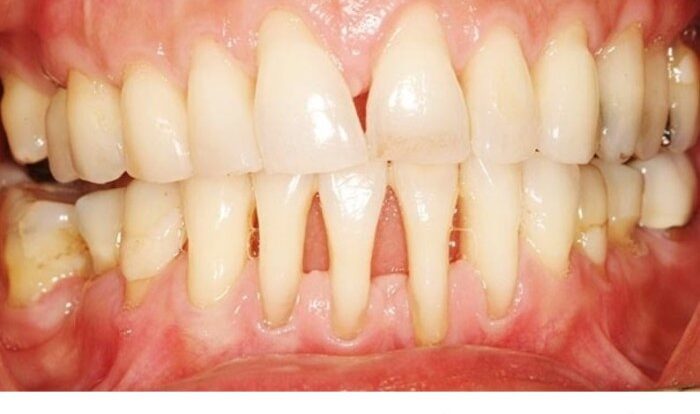
How to cure gum disease without a dentist – Gum disease is a common problem that can lead to serious health issues if left untreated. But what if you don’t have access to a dentist? Don’t worry, there are plenty of natural and home remedies that can help you cure gum disease without a dentist.
In this guide, we’ll discuss the different causes of gum disease, the symptoms to watch out for, and the best natural remedies to try. We’ll also provide tips on how to prevent gum disease in the future.
Natural Remedies for Gum Disease
Gum disease is a common problem that can lead to pain, bleeding, and even tooth loss. While there are many effective treatments available, some people prefer to try natural remedies first.
There are a number of natural remedies that have been shown to be effective in treating gum disease. These include:
Herbal Remedies
- Tea tree oil:Tea tree oil is a natural antiseptic and antibacterial agent that can help to kill the bacteria that cause gum disease.
- Myrrh:Myrrh is a natural anti-inflammatory agent that can help to reduce swelling and pain in the gums.
- Aloe vera:Aloe vera is a natural healing agent that can help to soothe and repair damaged gums.
Essential Oils
- Clove oil:Clove oil is a natural anesthetic and antibacterial agent that can help to relieve pain and kill bacteria.
- Peppermint oil:Peppermint oil is a natural anti-inflammatory and antiseptic agent that can help to reduce swelling and pain in the gums.
Homeopathic Treatments
- Calendula:Calendula is a natural anti-inflammatory agent that can help to reduce swelling and pain in the gums.
- Echinacea:Echinacea is a natural immune booster that can help to fight off the bacteria that cause gum disease.
- Goldenseal:Goldenseal is a natural antibiotic that can help to kill the bacteria that cause gum disease.
Dietary Modifications for Gum Health
Maintaining a balanced diet is crucial for overall health, including gum health. Certain vitamins and minerals play a vital role in strengthening gums and preventing gum disease.
Vitamin C
Vitamin C is essential for the production of collagen, a protein that provides structure and strength to the gums. Foods rich in vitamin C include citrus fruits, berries, leafy greens, and bell peppers.
Vitamin D
Vitamin D supports the immune system, which helps fight infections that can damage gums. Sunlight is the primary source of vitamin D, but it can also be obtained from fatty fish, fortified milk, and eggs.
Vitamin K
Vitamin K aids in blood clotting, which is important for preventing excessive bleeding during gum procedures. Leafy greens, broccoli, and brussels sprouts are good sources of vitamin K.
Foods to Avoid
Sugary drinks and processed foods can contribute to gum disease by feeding harmful bacteria in the mouth. Limiting these foods and opting for healthier alternatives, such as fruits, vegetables, and whole grains, can help maintain gum health.
Home Care Techniques for Gum Disease Prevention

Gum disease, also known as periodontal disease, is a common condition that affects the gums and the bones that support the teeth. It can cause a range of symptoms, including bleeding gums, swelling, pain, and bad breath. In severe cases, gum disease can lead to tooth loss.
There are a number of things you can do at home to prevent gum disease, including:
Proper Brushing and Flossing Techniques
Brushing and flossing your teeth regularly is essential for removing plaque and bacteria from your teeth and gums. Plaque is a sticky film that forms on your teeth and contains bacteria that can cause gum disease. Flossing helps to remove plaque from between your teeth, where your toothbrush can’t reach.
To brush your teeth properly, use a soft-bristled toothbrush and fluoride toothpaste. Brush your teeth for at least two minutes, twice a day. Be sure to brush all surfaces of your teeth, including the insides, outsides, and tops.
To floss your teeth properly, use a piece of dental floss about 18 inches long. Wrap the floss around your middle fingers and gently slide it between your teeth. Move the floss up and down, and side to side, to remove plaque and bacteria.
Mouthwashes and Dental Rinses
Mouthwashes and dental rinses can help to kill bacteria and reduce inflammation in the gums. There are a variety of mouthwashes and dental rinses available, so be sure to choose one that is right for you.
If you have gum disease, your dentist may recommend that you use a mouthwash or dental rinse that contains an antibacterial agent. These products can help to kill bacteria and reduce inflammation.
Regular Dental Check-ups
Regular dental check-ups are important for detecting and treating gum disease early on. Your dentist can check your gums for signs of disease and recommend treatment if necessary.
If you have any of the symptoms of gum disease, be sure to see your dentist as soon as possible. Early treatment can help to prevent the disease from progressing and causing serious damage to your teeth and gums.
Alternative Therapies for Gum Disease

Alternative therapies offer non-traditional approaches to address gum disease. They aim to complement or support conventional dental treatments. While scientific evidence varies, some alternative therapies show promising results.
Laser Therapy, How to cure gum disease without a dentist
Laser therapy utilizes concentrated light energy to target diseased gum tissue. It aims to reduce inflammation, kill bacteria, and promote tissue regeneration. Studies have demonstrated its effectiveness in reducing gum inflammation and improving gum health.
Ozone Therapy
Ozone therapy involves the use of ozone gas to treat gum disease. Ozone has antimicrobial properties that help reduce inflammation and kill bacteria. It can be administered topically or through injections into the gum tissue. Research suggests that ozone therapy may improve gum health and reduce bleeding.
Probiotics
Probiotics are live microorganisms that have health benefits when consumed. They can be found in fermented foods or supplements. Some studies indicate that probiotics may help improve gum health by balancing the oral microbiome and reducing inflammation.
Non-Invasive Treatment Options

Gum disease is a common problem that can lead to serious health issues if left untreated. There are a variety of non-invasive treatment options available that can help to improve gum health and prevent further damage.
These treatments include antibiotics, scaling and root planing, and fluoride treatments. Antibiotics are used to kill bacteria that cause gum disease. Scaling and root planing is a procedure that removes plaque and tartar from the teeth and roots. Fluoride treatments help to strengthen the teeth and prevent cavities.
Antibiotics
Antibiotics are often used to treat gum disease that is caused by bacteria. These medications can be taken orally or applied directly to the affected area. Common antibiotics used to treat gum disease include amoxicillin, penicillin, and metronidazole.
Antibiotics can be effective in treating gum disease, but they can also have side effects such as nausea, vomiting, and diarrhea. It is important to take antibiotics as directed by your doctor and to finish the entire course of treatment.
Scaling and Root Planing
Scaling and root planing is a procedure that removes plaque and tartar from the teeth and roots. This procedure is typically performed by a dentist or dental hygienist using a special tool called a scaler. Scaling and root planing can be uncomfortable, but it is an effective way to remove bacteria and improve gum health.
Fluoride Treatments
Fluoride treatments help to strengthen the teeth and prevent cavities. These treatments can be applied to the teeth in a variety of ways, including toothpaste, mouthwash, and gels. Fluoride treatments can be effective in preventing gum disease by reducing the amount of bacteria in the mouth.
Ending Remarks
Gum disease is a serious problem, but it can be cured with the right treatment. If you’re experiencing any of the symptoms of gum disease, don’t hesitate to see a dentist or try one of the natural remedies discussed in this guide.
With a little effort, you can get your gums healthy again and keep them that way for good.
Expert Answers: How To Cure Gum Disease Without A Dentist
Can I cure gum disease without a dentist?
Yes, it is possible to cure gum disease without a dentist, but it is important to see a dentist if the condition is severe.
What are the best natural remedies for gum disease?
Some of the best natural remedies for gum disease include tea tree oil, myrrh, aloe vera, clove oil, and peppermint oil.
How can I prevent gum disease?
You can prevent gum disease by brushing and flossing your teeth regularly, eating a healthy diet, and avoiding sugary drinks and processed foods.





